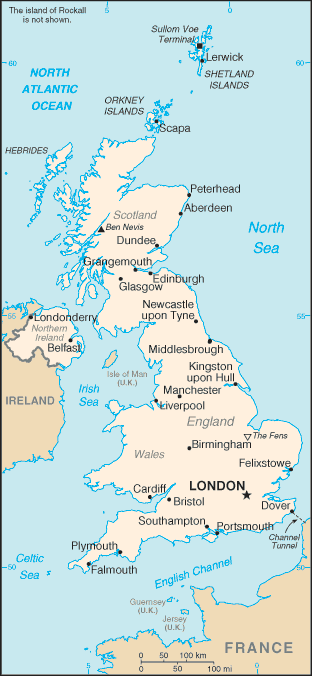Map:

Overview:
Great Britain, the dominant industrial and maritime power of the 19th century, played a leading role in developing parliamentary democracy and in advancing literature and science. At its zenith, the British Empire stretched over one-fourth of the earth's surface. The first half of the 20th century saw the UK's strength seriously depleted in two World Wars. The second half witnessed the dismantling of the Empire and the UK rebuilding itself into a modern and prosperous European nation. As one of five permanent members of the UN Security Council, a founding member of NATO, and of the Commonwealth, the UK pursues a global approach to foreign policy; it currently is weighing the degree of its integration with continental Europe. A member of the EU, it chose to remain outside the Economic and Monetary Union for the time being. Constitutional reform is also a significant issue in the UK. The Scottish Parliament, the National Assembly for Wales, and the Northern Ireland Assembly were established in 1999, but the latter is suspended due to bickering over the peace process.
The People:
Population: 60,441,457 (July 2005 est.)
Age structure:
0-14 years: 17.7% (male 5,490,592/female 5,229,691)
15-64 years: 66.5% (male 20,329,272/female 19,855,862)
65 years and over: 15.8% (male 4,063,357/female 5,472,683) (2005 est.)
Religions:
Christian (Anglican, Roman Catholic, Presbyterian, Methodist) 71.6%, Muslim 2.7%, Hindu 1%, other 1.6%, unspecified or none 23.1% (2001 census)
Government Type:
constitutional monarchy
Leader(s) to pray for:
chief of state: Queen ELIZABETH II (since 6 February 1952); Heir Apparent Prince CHARLES (son of the queen, born 14 November 1948)
head of government: Prime Minister Anthony (Tony) BLAIR (since 2 May 1997)
Source: The World Factbook
View All Countries